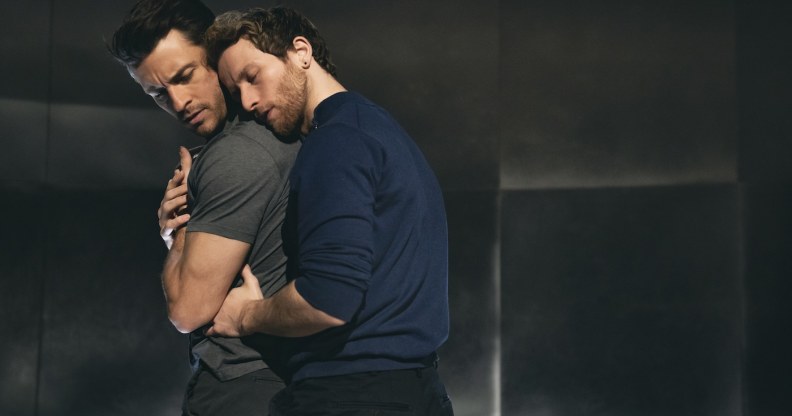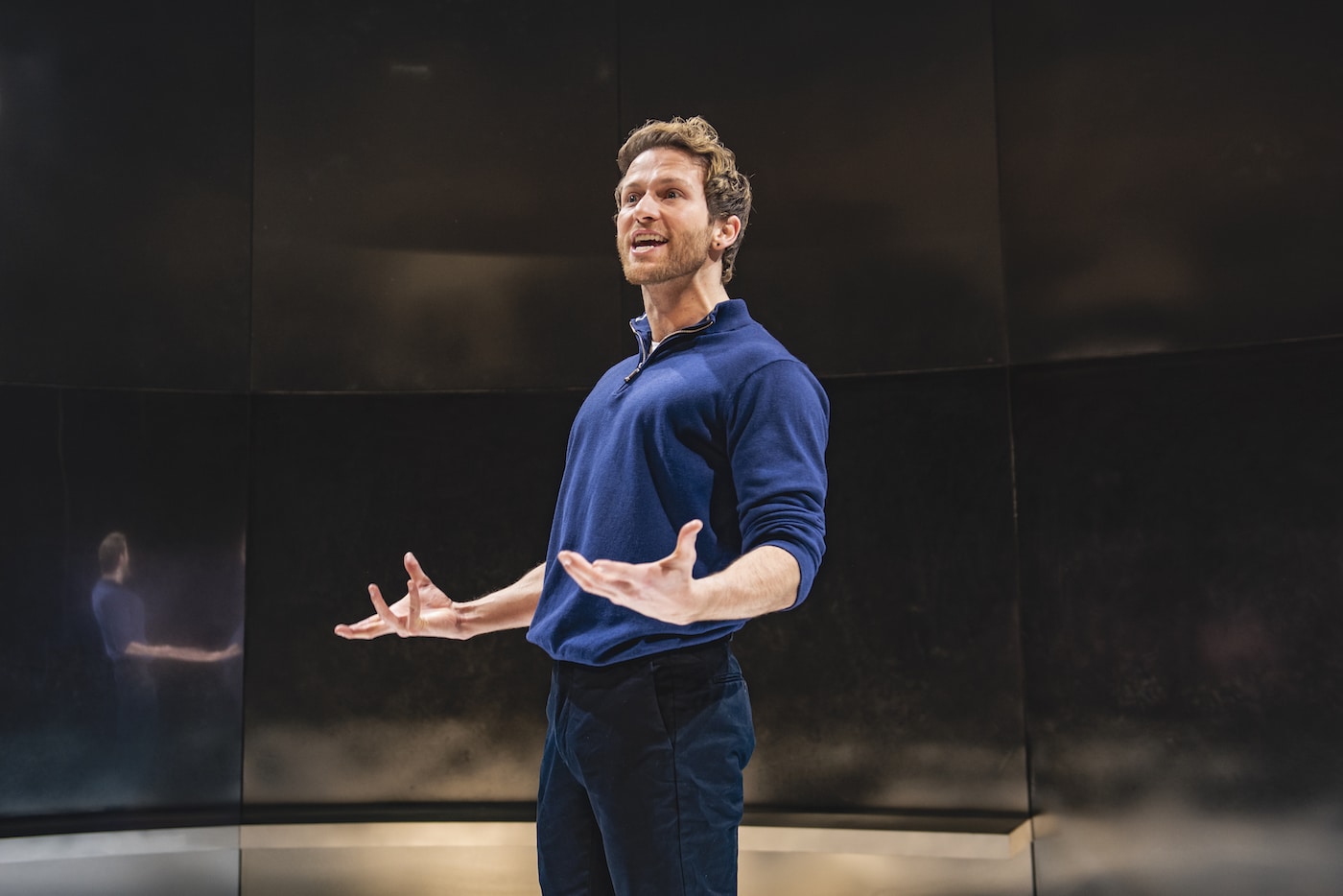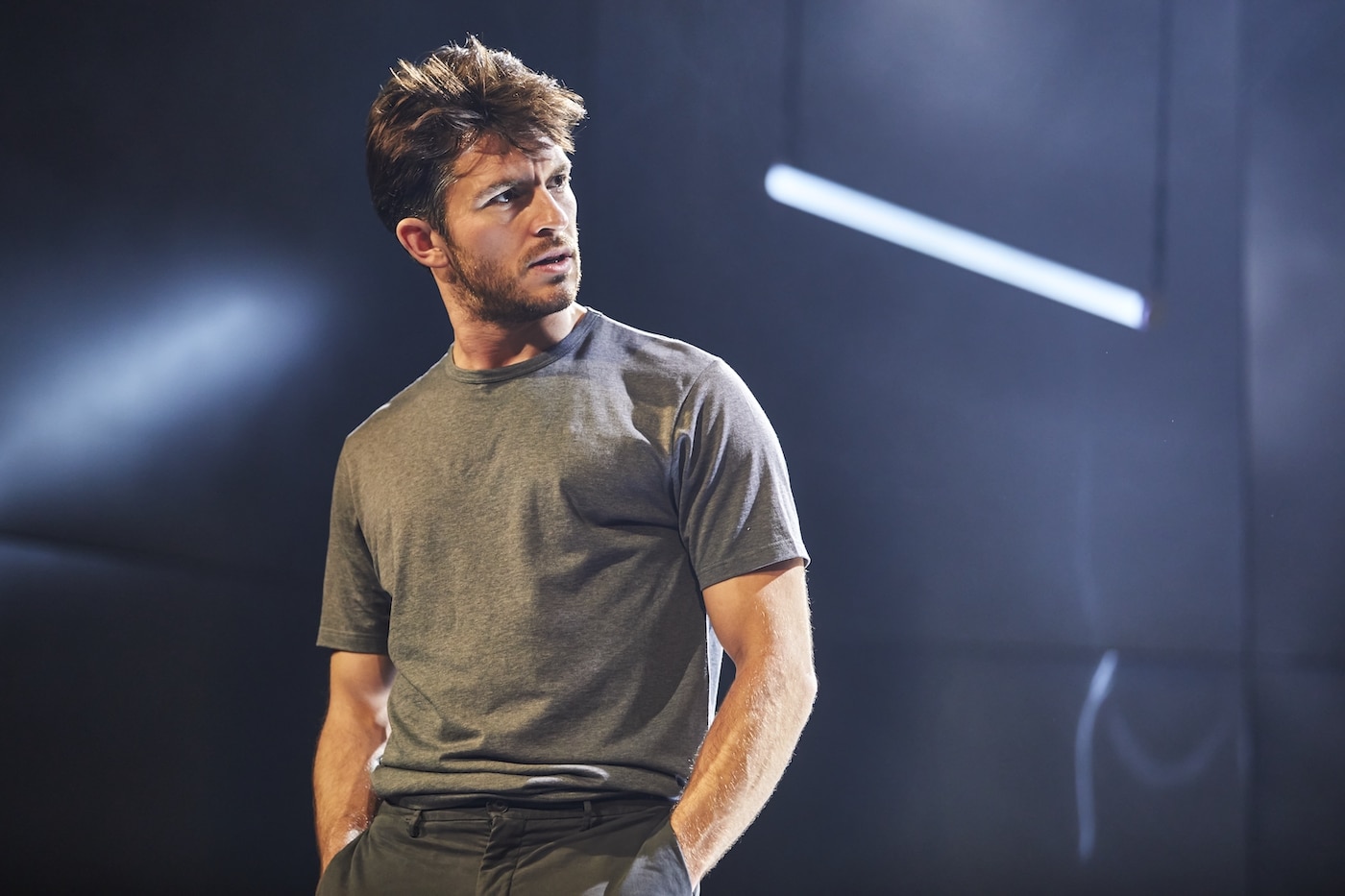C*ck actor Joel Harper-Jackson on replacing Taron Egerton: ‘You’ve got to grab the bull and ride it’

Jonathan Bailey & Joel Harper-Jackson in Cock. (Matt Crockett)
Joel Harper-Jackson was ‘overwhelmed’ when he was suddenly thrust on stage opposite Jonathan Bailey in West End play C*ck.
When C*ck opened on the West End, Bridgerton star Jonathan Bailey and Rocketman actor Taron Egerton were playing the couple at the centre of the play. Joel, who was understudy for both, was excited to have the chance to watch two distinguished actors crafting their performances at close quarters.
Nobody could have predicted what was to come. During their first preview performance, Taron Egerton collapsed on stage, meaning Joel had to take over. Shortly afterwards, Egerton contracted COVID-19 – and then came a bombshell: he decided to pull out of the play due to personal reasons.
Just like that, Joel Harper-Jackson ascended from understudy to lead actor. As he enters the final few weeks of the show, PinkNews caught up with the actor to talk queer representation, working with Bailey, and why no two nights of C*ck are the same.
PinkNews: Let’s start at the beginning – how did you come to be an understudy in C*ck?
Joel: It was October last year, I saw the cast announcement and straight away I messaged my agent and said, ‘I don’t care what it is but I want to be involved in this in some way.’ I got a self-tape through and it was to understudy both Jonathan and Taron, and within a day or two an offer came through to cover both. It all happened extraordinarily fast.
Some of my agents and my dad particularly didn’t really want me to do it. He said, ‘You haven’t understudied in about seven years so you’re taking a step backwards.’ I said, the caliber of the piece and who I’d be understudying and the director, it’s quite a big deal. So I was a little bit tentative, I’m not going to lie, simply because I thought I’d be sat in a dressing room and I wouldn’t really be going on and it would just be a case of watching and learning. And then cut to of course what’s happened, it’s been quite different from what I anticipated.

Joel Harper-Jackson as M in C*ck. (Matt Crockett)
What was it like when Taron collapsed on stage during the first preview?
All of the understudies were sat in the dressing room backstage listening to the show over the tannoy, and then all of a sudden the stage went quiet. There was a bit of a commotion and we heard a paramedic being asked for. It was panic stations, everyone was just wondering what on earth had happened. Ten minutes later someone from stage management came in and told us that he had collapsed, a paramedic had checked him over, he was absolutely fine.
Ten minutes later again they came back in and said, ‘Would you just get into your costume, just in case?’ And then another 10 minutes goes by and they say, ‘We’d like you to go on actually.’
I thought panicking would just make the situation worse so I went into logical mode and said, ‘OK, right, off we go.’ Considering I’d never been on the stage – I’d stood on it for a warm up but I’d never walked it through or rehearsed anything on stage – it was quite a crazy moment, but fortunately the cast were amazing, the audience was exceptional, they just greeted us with such a lovely response and just made me feel like I could do it.
Shortly afterwards, Taron pulled out of the production and you were offered the chance to play the part full-time. Was that a shock when the call came through?
Absolutely. He had tested positive for COVID so I was just waiting for the green light for him to test negative, have two days, and then he’d be back. Funnily enough it was April Fool’s, I was eating my breakfast, and I got a call from Chris Harper. … I burst into tears. I didn’t quite believe it. It is a little bit overwhelming, I’m not going to lie, but these opportunities rarely come around, so you’ve just got to grab the bull by the horns and ride it and make the best of the situation, and I’m having the best time. It’s been wild.
How did you go about making the character your own?
Marianne [Elliott, director of C*ck] had a very clear idea of who M was so there were certain things that I obviously had to stick to and adhere to, but she did ask me, ‘What do you want to bring to this part?’ It’s been changing every week and I feel like, as the run goes on, it’s still forever changing and evolving. In the last week or two I feel like the character has changed again because Johnny [Bailey] loves to play as an actor – he loves things to evolve, and I feel like I’ve got permission to do that now with him and the creative team. I feel like I’ve really started to find who he is as time has gone on. It feels completely different to when I first took over.

Jonathan Bailey in C*ck. (Matt Crockett)
It’s a play that charts the complexities of sexuality – why is it important that we explore LGBTQ+ identity?
Representation really matters. As I was growing up, the kind of gay stories that were told were all quite tragic. It would always be about the ’80s or Brokeback Mountain, all these things were full of anguish and trauma, and while this play explores that, it’s not as bad.
I just think it’s so important that every single aspect of queer people’s lives is told. That’s why I think Heartstopper is so important because when I was initially watching it I thought, ‘Oh God, it’s a bit twee and a bit light,’ but actually it was so refreshing to just have a really simple, beautiful story told that didn’t involve loads of trauma. I think it’s important for queer people to see themselves on screen and on stage so they can feel that it’s OK and it’s not some horror story.
It’s also great to see that with this play we have queer actors playing queer roles. There’s been a lot of debate about whether straight people should be playing gay or lesbian characters in the last few years – what are your thoughts?
My opinion is that, if that was the case that LGBTQ actors can only play those parts then that would also limit me to only playing those parts and I’d never be able to play a straight character, which I see as quite limiting. I think the best actors should be picked for the role, but saying that, I do think there needs to be a slight shift in Hollywood.
All the big blockbuster films, Brokeback Mountain, Philadelphia, Call Me By Your Name, all these big gay movies that which have had such a huge reception and have been applauded and praised, every single one of them features two straight men, and that’s what really bugs me. There needs to be a balance – there should be at least one queer actor in there.
What would you like to do next after this play?
I would like to go into screen. If we’re talking ‘sky’s the limit’, I’d like to be an openly gay actor in Hollywood doing big blockbusters, being in action films – I don’t feel like there are many gay actors that are seen in those roles. One of them is Luke Evans, he’s done a lot of roles like that, and I’d love to follow his trajectory and his path. Not only being a gay actor straight roles, but I’d love to be a gay actor playing a gay role in a big action blockbuster because I think that’s not been done before. Like I said earlier, queer actors need to be seen in all areas of life because we’re a colourful bunch and we can do absolutely anything. we’re not just limited to one stereotype that society tends to put us into.
C*ck runs at the Ambassadors Theatre London until 4 June. Tickets are available here.
This article contains affiliate links, PinkNews may earn revenue if you click through and purchase products through the links.

